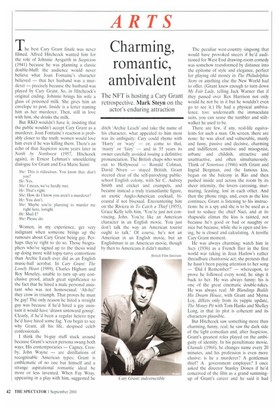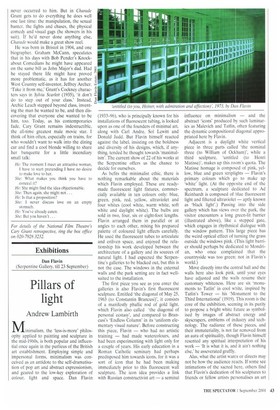Charming, romantic, ambivalent
The NFT is hosting a Cary Grant retrospective. Mark Steyn on the actor's enduring attraction
ditch 'Archie Leach' and take the name of his character, what appealed to him most was its ambiguity: Cary could rhyme with 'Harry' or 'wary' — or, come to that, 'marry' or 'fairy' — and in 55 years its owner carefully avoided issuing a definitive pronunciation. The British chaps who went out to Hollywood — Ronald Colman, David Niven — stayed British. Grant steered clear of the self-parodying publicschool English colony, with Sir C. Aubrey Smith and cricket and crumpets, and became instead a truly transatlantic figure, an exotic Anglo-American cocktail, bicoastal if not bisexual. Encountering him on the Riviera in To Catch a Thief (1955), Grace Kelly tells him, 'You're just not convincing, John. You're like an American character in an English movie. You just don't talk the way an American tourist ought to talk.' Of course, he's not an American in an English movie, but an Englishman in an American movie, though by then to Americans it didn't matter. The peculiar west-country singsong that would have provoked sneers if he'd auditioned for West End drawing-room comedy was somehow transformed by distance into the epitome of style and elegance, perfect for playing old money in The Philadelphia Story or anything else the New World had to offer. (Grant knew enough to turn down My Fair Lady, telling Jack Warner that if they passed over Rex Harrison not only would he not be in it but he wouldn't even go to see it.) He had a physical ambivalence, too: underneath the immaculate suits, you can sense the tumbler and stiltwalker he used to be.
There are few, if any, real-life equivalents for such a man. On screen, there are none: he was aloof and vulnerable, manly and fussy, passive and decisive, charming and indifferent, sensitive and misogynist, urbane and childish, attractive and unattractive, and often simultaneously. Think of Notorious (1946) with Grant and Ingrid Bergman, and the famous kiss, begun on the balcony in Rio and then pushed inside and across the room by its sheer intensity, the lovers caressing, murmuring, feasting, lost in each other. And then the phone rings, and, even as the kiss continues, Grant is listening to his instructions: he is a spy and she is to be used as a tool to seduce the chief Nazi, and at its rhapsodic climax the kiss is tainted, not because he's good or bad or naughty or nice but because, while she is open and loving, he is closed and calculating. A terrific Cary Grant moment.
He was always charming: watch him in Suzy (1936) as a French flier in the first world war taking in Jean Harlow's rather threadbare chantoosie act; she protests that he hasn't been paying attention to her song — 'Did I Remember?' — whereupon, to prove he followed every word, he sings it back to her. He was always funny: his is one of the great cinematic double-takes. He was always real: Mr Blandings Builds His Dream House, with Grant and Myrna Loy, differs only from its yuppie update, The Money Pit with Tom Hanks and Shelley Long, in that its plot is coherent and its characters plausible.
But Hitchcock saw something more than charming, funny, real; he saw the dark side of the light comedian and, after Suspicion, Grant's greatest roles played on the ambiguity of identity. In his penultimate movie, Charade (1964), he changes name every 20 minutes, and his profession is even more elusive: is he a murderer? A gentleman thief? A government employee? I once asked the director Stanley Donen if he'd conceived of the film as a grand summingup of Grant's career and he said it had never occurred to him. But in Charade Grant gets to do everything he does well one last time: the manipulation, the sexual banter, the fights and chases, the physical comedy and visual gags (he showers in his suit). If he'd never done anything else, Charade would make a great show reel.
He was born in Bristol in 1904, and one biographer. Graham McCann, speculates that in his days with Bob Pender's Knockabout Comedians he might have appeared on the same bill as John Major's dad. Had he stayed there life might have proved more problematic, as it has for another 1-5, West Country self-inventor, Jeffrey Archer. 'Take it from me,' Grant's Cockney characters says in Sylvia Scarlett (1935), it don't do to step out of your class.' Instead, 2 Archie Leach stepped beyond class, inventing the man he wanted to be, and then discovering that everyone else wanted to be him, too. Today, as his contemporaries fade, Cary Grant remains indestructible, the all-time greatest male movie star. I think of him often, especially on trains, for who wouldn't want to walk into the dining car and find a cool blonde willing to share her banquette for a little incendiary small talk: He: The moment I meet an attractive woman, I have to start pretending I have no desire to make love to her.
She: What makes you think you have to conceal it?
He: She might find the idea objectionable. She: Then again, she might not.
He: He: Is that a proposition?
She: 1 never discuss love on an empty stomach.
He: You've already eaten.
She: But you haven't
For details of the National Film Theatre's Cary Grant retrospective, ring the box office on 020-7928 3232.



























































 Previous page
Previous page